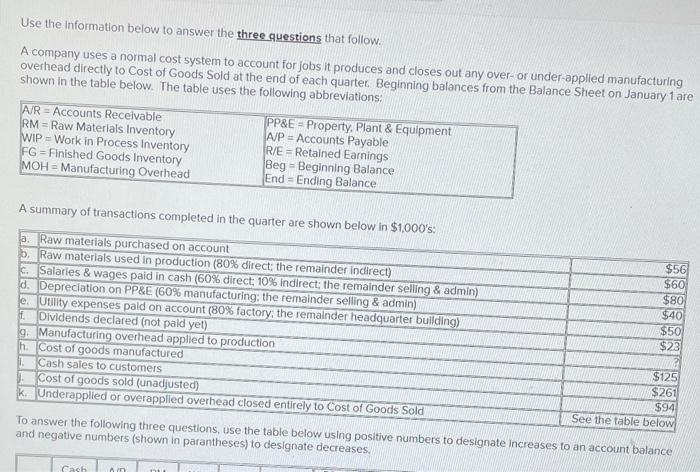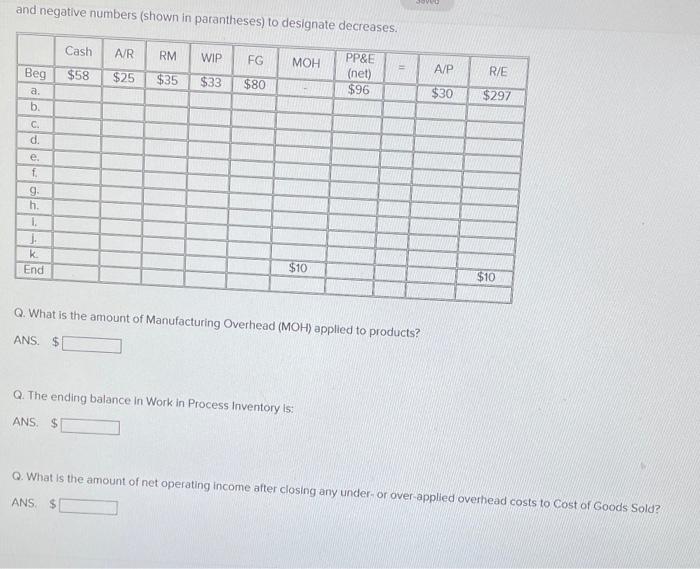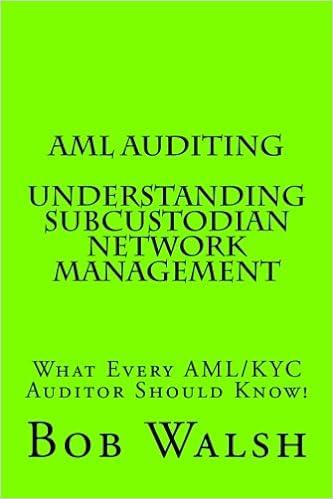Use the information below to answer the three questions that follow. A company uses a normal cost system to account for jobs it produces and closes out any over- or under-applied manufacturing overhead directly to Cost of Goods Sold at the end of each quarter. Beginning balances from the Balance Sheet on January 1 are shown in the table below. The table uses the following abbreviations A/R = Accounts Receivable PP&E = Property, Plant & Equipment RM = Raw Materials inventory A/P = Accounts Payable WIP = Work in Process Inventory RE=Retained Earnings FG = Finished Goods Inventory Beg = Beginning Balance MOH = Manufacturing Overhead End = Ending Balance A summary of transactions completed in the quarter are shown below in $1.000's f a. Raw materials purchased on account $56 Raw materials used in production (80% direct; the remainder indirect) $60 Salaries & wages paid in cash (60% direct, 10% indirect: the remainder selling & admin) $80 d. Depreciation on PP&E (60% manufacturing the remainder selling & admin) $40 le Uulity expenses paid on account (80% factory, the remainder headquarter building) $50 Dividends declared (not paid yel) $23 g. Manufacturing overhead applied to production in Cost of goods manufactured $125 1. Cash sales to customers $261 Cost of goods sold (unadjusted) $94 K Underapplied or overapplied overhead closed entirely to Cost of Goods Sold See the table below To answer the following three questions, use the table below using positive numbers to designate increases to an account balance and negative numbers (shown in parantheses) to designate decreases. Cash An SOV and negative numbers (shown in parantheses) to designate decreases. Cash AR RM WIP FG MOH = Beg $58 A/P PP&E (net) $96 $25 R/E $35 $33 $80 a. $30 $297 b C. d. e. f g h. K End $10 $10 Q. What is the amount of Manufacturing Overhead (MOH) applied to products? ANS $ Q. The ending balance in Work in Process Inventory is: ANS. $ Q. What is the amount of net operating income after closing any under or over-applied overhead costs to cost of Goods Sold? ANS $ Use the information below to answer the three questions that follow. A company uses a normal cost system to account for jobs it produces and closes out any over- or under-applied manufacturing overhead directly to Cost of Goods Sold at the end of each quarter. Beginning balances from the Balance Sheet on January 1 are shown in the table below. The table uses the following abbreviations A/R = Accounts Receivable PP&E = Property, Plant & Equipment RM = Raw Materials inventory A/P = Accounts Payable WIP = Work in Process Inventory RE=Retained Earnings FG = Finished Goods Inventory Beg = Beginning Balance MOH = Manufacturing Overhead End = Ending Balance A summary of transactions completed in the quarter are shown below in $1.000's f a. Raw materials purchased on account $56 Raw materials used in production (80% direct; the remainder indirect) $60 Salaries & wages paid in cash (60% direct, 10% indirect: the remainder selling & admin) $80 d. Depreciation on PP&E (60% manufacturing the remainder selling & admin) $40 le Uulity expenses paid on account (80% factory, the remainder headquarter building) $50 Dividends declared (not paid yel) $23 g. Manufacturing overhead applied to production in Cost of goods manufactured $125 1. Cash sales to customers $261 Cost of goods sold (unadjusted) $94 K Underapplied or overapplied overhead closed entirely to Cost of Goods Sold See the table below To answer the following three questions, use the table below using positive numbers to designate increases to an account balance and negative numbers (shown in parantheses) to designate decreases. Cash An SOV and negative numbers (shown in parantheses) to designate decreases. Cash AR RM WIP FG MOH = Beg $58 A/P PP&E (net) $96 $25 R/E $35 $33 $80 a. $30 $297 b C. d. e. f g h. K End $10 $10 Q. What is the amount of Manufacturing Overhead (MOH) applied to products? ANS $ Q. The ending balance in Work in Process Inventory is: ANS. $ Q. What is the amount of net operating income after closing any under or over-applied overhead costs to cost of Goods Sold? ANS $








